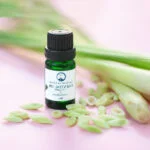Pregnancy is a special time in a woman’s life that often comes with its own set of challenges and discomforts. Many expectant mothers turn to natural remedies, such as aromatherapy, to help alleviate some of these symptoms. One common essential oil that is often used for its refreshing and invigorating scent is Lemongrass. But the question remains: is Lemongrass aromatherapy safe for pregnancy?
Lemongrass essential oil is derived from the leaves and stalks of the lemongrass plant, known for its citrusy and herbal fragrance. It has been traditionally used for various purposes, including as a natural insect repellent and for its soothing properties. However, when it comes to using Lemongrass aromatherapy during pregnancy, there are safety concerns that need to be addressed.
While Lemongrass aromatherapy can offer benefits such as stress relief, improved mood, and relaxation for pregnant women, there are potential risks that should not be overlooked. It is important to understand the safety precautions and guidelines when using essential oils during pregnancy to ensure the well-being of both mother and baby.
In the following sections, we will explore the safety concerns associated with Lemongrass aromatherapy during pregnancy, as well as alternative essential oils that are considered safe for use during this special time.
What Is Lemongrass
Lemongrass is a popular essential oil known for its citrusy and invigorating aroma. It is derived from the leaves and stalks of the lemongrass plant, scientifically known as Cymbopogon citratus. This oil is commonly used in aromatherapy due to its refreshing scent and potential therapeutic benefits. Lemongrass essential oil is believed to possess antimicrobial, anti-inflammatory, and antifungal properties, making it a versatile option for various uses.
Uses of Lemongrass Essential Oil
Lemongrass essential oil can be utilized in a variety of ways to promote well-being and relaxation. In aromatherapy, it is often diffused to uplift mood, reduce stress, and create a calming atmosphere. The oil can also be applied topically when diluted with a carrier oil to alleviate muscle pain, ease headaches, or improve skin health. Some individuals even incorporate Lemongrass essential oil into their cleaning routines for its antibacterial properties.
Potential Benefits for Pregnancy
While Lemongrass aromatherapy is generally safe for most individuals, including pregnant women, it is important to exercise caution due to individual sensitivities. Pregnant women may find Lemongrass essential oil beneficial for alleviating nausea, reducing stress levels, and boosting energy during pregnancy.
However, consulting with a healthcare provider before incorporating any new aromatherapy products into one’s routine is crucial to ensure safety for both the expectant mother and the baby. Despite its potential benefits, moderation and proper dilution are key when using Lemongrass essential oil during pregnancy.
By understanding the properties and uses of Lemongrass essential oil, pregnant women can make informed decisions about incorporating this aromatic option into their wellness routines. With proper precautions and guidance from healthcare professionals, Lemongrass aromatherapy can be a safe and effective addition to support overall well-being during pregnancy.
Remember that every individual may react differently to certain scents or oils, so it’s always best to proceed with caution when introducing new products – especially during such an important time as pregnancy.
Safety Concerns
During pregnancy, many women seek natural remedies to alleviate common discomforts such as nausea, fatigue, and stress. Aromatherapy is one such option that offers a gentle and holistic approach to promoting well-being. Lemongrass essential oil is commonly used in aromatherapy for its refreshing citrus scent and potential health benefits, but is lemongrass aromatherapy safe for pregnancy? It’s essential for expectant mothers to consider the safety concerns associated with using Lemongrass aromatherapy during this sensitive time.
Here are some potential risks to be aware of when using Lemongrass essential oil during pregnancy:
1. Skin Sensitivity: Lemongrass oil is known to be a skin irritant, especially when used in high concentrations or on sensitive skin. Pregnant women may already experience heightened skin sensitivity due to hormonal changes, so it’s crucial to perform a patch test before using Lemongrass aromatherapy topically.
2. Hormonal Effects: Some essential oils, including Lemongrass, contain compounds that can have hormonal effects on the body. Pregnant women should use caution when using essential oils that may disrupt hormone balance or affect fetal development. Consulting with a healthcare provider before incorporating Lemongrass aromatherapy into your routine is recommended.
3. Risk of Allergic Reactions: Individuals may have allergies or sensitivities to certain essential oils, including Lemongrass. During pregnancy, the immune system undergoes changes that may increase susceptibility to allergic reactions. It’s important to start with small amounts of Lemongrass oil and monitor for any adverse effects before continuing use.
In light of these safety concerns, pregnant women should proceed with caution when considering Lemongrass aromatherapy as part of their self-care routine. It is always best to consult with a qualified healthcare provider before using any essential oils during pregnancy to ensure the safety of both mother and baby.
Benefits of Lemongrass Aromatherapy
Exploring the benefits of Lemongrass aromatherapy for pregnant women can shed light on its potential positive effects on expectant mothers. Lemongrass essential oil is known for its refreshing, citrusy scent and several therapeutic properties that can be particularly beneficial during pregnancy.
Relief From Nausea and Morning Sickness
One of the primary benefits of Lemongrass aromatherapy for pregnant women is its ability to help alleviate nausea and morning sickness. The invigorating aroma of Lemongrass can help soothe an upset stomach and reduce feelings of queasiness, making it a natural remedy for pregnant women experiencing these common pregnancy symptoms.
Stress Reduction and Relaxation
Pregnancy can often bring about heightened stress levels and anxiety due to hormonal changes and the anticipation of motherhood. Lemongrass aromatherapy can promote relaxation and reduce stress by calming the mind and body. Inhaling the citrusy aroma of Lemongrass essential oil can have a calming effect, helping pregnant women feel more at ease during this sensitive time.
Boosting Energy Levels
Fatigue is a common complaint among pregnant women, especially during the early and late stages of pregnancy. Lemongrass aromatherapy is known to have energizing properties that can help boost energy levels naturally. Inhaling the uplifting scent of Lemongrass essential oil can provide expectant mothers with a much-needed energy boost to combat feelings of tiredness and sluggishness.
Alternative Essential Oils
During pregnancy, it is essential to prioritize the safety and well-being of both the mother and the developing baby. While Lemongrass aromatherapy can offer various benefits, some expectant mothers may have concerns about its safety during pregnancy. Fortunately, there are several alternative essential oils that can provide similar benefits without any potential risks. Here are some safe alternatives to Lemongrass for pregnancy-related aromatherapy:
- Lavender: Known for its calming and soothing properties, lavender essential oil can help alleviate stress and anxiety during pregnancy. It is also believed to promote better sleep quality, which can be particularly beneficial for pregnant women experiencing insomnia or restlessness.
- Chamomile: Chamomile essential oil is gentle and mild, making it a safe option for expecting mothers. It is often used to reduce inflammation, soothe skin irritations, and promote relaxation. Chamomile aromatherapy can also help with mood stabilization and emotional balance.
- Ylang Ylang: This floral essential oil has a sweet and exotic aroma that is commonly used to improve mood and reduce feelings of stress or tension. Ylang ylang is believed to have a calming effect on the mind and body, making it a suitable choice for pregnant women seeking emotional support.
While Lemongrass aromatherapy may not be recommended for use during pregnancy due to its potentially stimulating effects, these alternative essential oils provide expectant mothers with safe options for enjoying the benefits of aromatherapy without any associated risks. It is always advisable to consult with a healthcare provider before using any new essential oils or products during pregnancy.
Tips for Using Alternative Essential Oils Safely During Pregnancy
- Avoid applying undiluted essential oils directly onto the skin, especially during pregnancy.
- Use a diffuser to enjoy the aromatic benefits of essential oils without direct contact with the skin.
- Start with small amounts of diluted essential oil to test for any sensitivities or reactions before regular use.
Tips for Using Lemongrass
Lemongrass aromatherapy can be a soothing and refreshing practice for pregnant women, providing relaxation and stress relief during this sensitive time. However, it is crucial to understand the best practices for incorporating Lemongrass essential oil into your pregnancy routine to ensure safety and efficacy.
The aroma of Lemongrass is known for its energizing properties, which can help combat fatigue and promote mental clarity. When using Lemongrass aromatherapy during pregnancy, it is important to dilute the essential oil properly to avoid any adverse reactions.
One of the safest ways to use Lemongrass essential oil during pregnancy is through diffusing. By adding a few drops of Lemongrass to a diffuser, you can enjoy the invigorating scent without direct contact with your skin. This method allows the aroma to spread throughout the room, creating a calming ambiance that can benefit both you and your growing baby. Additionally, using Lemongrass in a steam inhalation can help alleviate congestion and enhance respiratory function-a common discomfort during pregnancy.
Another safe way to incorporate Lemongrass aromatherapy into your pregnancy routine is by blending it with carrier oils for topical application. When applying diluted Lemongrass oil to your skin, be sure to perform a patch test first to check for any allergic reactions or sensitivities.
Mixing one or two drops of Lemongrass with a tablespoon of carrier oil like coconut or sweet almond oil is generally safe for pregnant women. This method allows you to experience the benefits of Lemongrass while minimizing the risk of skin irritation.
| Lemongrass Aromatherapy Tips | Benefits |
|---|---|
| Use a diffuser for indirect inhalation | Promotes relaxation and stress relief |
| Dilute in carrier oils for topical application | Alleviates congestion and supports respiratory health |
| Perform patch test before topical use | Minimizes risks of skin irritation or allergic reactions |
Consultation With a Healthcare Provider
During pregnancy, many women turn to natural remedies like aromatherapy to alleviate symptoms and promote relaxation. Lemongrass essential oil is a popular choice due to its refreshing scent and potential benefits. However, the question remains: is lemongrass aromatherapy safe for pregnancy? It’s crucial for expecting mothers to consult with a healthcare provider before using any essential oils during this sensitive time.
While lemongrass aromatherapy can offer benefits such as reducing stress, relieving nausea, and boosting energy levels, there are safety concerns to consider. Lemongrass essential oil is known for its strong properties and may cause skin irritation or allergic reactions in some individuals. Additionally, there is limited research on the effects of lemongrass aromatherapy specifically during pregnancy. This underscores the importance of seeking guidance from a healthcare provider before incorporating it into your routine.
When discussing the use of lemongrass aromatherapy with your healthcare provider, be sure to provide all relevant information about your pregnancy and any pre-existing conditions. They can offer personalized advice based on your unique situation and help determine if lemongrass essential oil is safe for you and your baby. It’s always better to err on the side of caution when it comes to using essential oils during pregnancy, making professional guidance essential.
| Benefits | Safety Concerns |
|---|---|
| Reducing stress | Skin irritation |
| Relieving nausea | Allergic reactions |
| Boosting energy levels | Limited research on effects during pregnancy |
Conclusion
In conclusion, the safety of Lemongrass aromatherapy for pregnancy ultimately depends on various factors such as individual sensitivities, trimester of pregnancy, and proper usage. While Lemongrass essential oil is generally considered safe when used in moderation and properly diluted, there are potential risks associated with its use during pregnancy that should not be overlooked.
It is crucial for pregnant women to consult with their healthcare provider before incorporating any form of aromatherapy into their routine to ensure the well-being of both mother and baby.
Although Lemongrass aromatherapy can offer benefits such as stress relief, relaxation, and improved mood, pregnant women may want to consider using alternative essential oils that are known to be safer during pregnancy. Essential oils like lavender, chamomile, and mandarin are often recommended as gentle options for expecting mothers seeking the therapeutic benefits of aromatherapy without the potential risks associated with certain oils like Lemongrass.
In essence, while Lemongrass aromatherapy can be a valuable addition to a pregnancy wellness routine when used cautiously and with professional guidance, it is essential to prioritize safety above all else. Pregnant women should prioritize the advice and expertise of their healthcare provider when considering any form of alternative therapy during this critical time. The key is to make informed decisions that prioritize the health and safety of both mother and child throughout the journey of pregnancy.
Frequently Asked Questions
Is Lemongrass Essential Oil Safe to Diffuse During Pregnancy?
Lemongrass essential oil is generally considered safe to diffuse during pregnancy, but it’s important to exercise caution. Some experts recommend avoiding it in the first trimester due to its potential effect on hormonal levels. Always consult with your healthcare provider before using any essential oils during pregnancy.
What Essential Oils Should Be Avoided During Pregnancy?
There are some essential oils that should be avoided during pregnancy due to their potential risks. Oils like camphor, pennyroyal, and wintergreen are known to be harmful during pregnancy. It’s crucial to research and seek guidance from a healthcare professional before using any essential oils while pregnant.
Can You Use Lemon Essential Oil While Pregnant?
Lemon essential oil is generally considered safe for use during pregnancy when properly diluted and used in moderation. Its citrusy aroma can be uplifting and energizing for expectant mothers. However, as with any essential oil use during pregnancy, it’s best to consult with a healthcare provider beforehand to ensure it is safe for your individual circumstances.

Are you looking for a natural way to improve your health and wellbeing?
If so, aromatherapy may be the answer for you.





